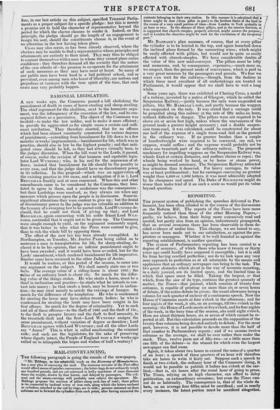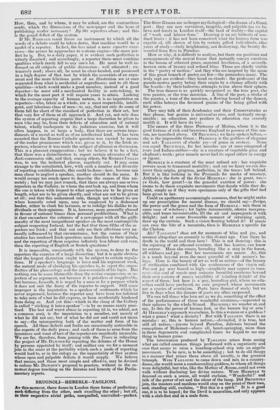REPORTING.
THE present system of publishing the speeches delivered in Par- liament, has been often alluded to in the course of' the discussions on the Reform Bill. The reports of the Times have been more frequently noticed than those of the other Morning Papers,— partly, we believe, from their being more extensively read and quoted, but partly also from an opinion, industriously propagated, that on several occasions there has been observable in them de- cided evidence of undue bias. This charge, we are bound to say, has never been made out to our satisfaction, as against the pro- prietors or managers. Whether it be well founded as against the reporting establishment, is another question.
The system of Parliamentary reporting has been carried to a degree of accuracy, of which those who knew it twenty or thirty years ago could hardly have supposed it susceptible; but it is still far from having reached perfection; nor do we look upon any very near approach to perfection as at all attainable by the means and appliances that an ordinary newspaper can bring to the task. The two great obstacles which stand in the way of accurate reporting, in a daily journal, are its limited space, and the limited time in which that space must be filled. Taking the largest, or that which, from the size of its type, contains the greatest quantity of matter, the Times—that journal, which consists of twenty-four columns, is capable of printing no more than six or seven hours of debate, if the entire debate be given; the usual allowance being a column for each quarter of an hour of a continuous speech. Now the House of Commons meets at four o'clock in the afternoon; and for four nights of the week, it sits, on an average, till two o'clock in the morning: the House of Lords meets at five o'clock, and for four nights of the week, in the busy time of the session, sits until eight o'clock, Here are about thirteen hours, six or seven of which cannot be re- ported at all. But this calculation proceeds on the supposition of the twenty-four columns being devoted entirely to debate. For the most part, however, it is not possible to devote more than the half of that number to Parliamentary reports ; and if we assume twelve columns as the average, we shall be over rather than under the mark. Thus, twelve parts out of fifty-two—or a little more than one fifth of the debate—is the utmost for which even the largest newspaper can find room. Again, it takes about two hours to extend the notes of a quarter of an hour; a speech of three quarters of an hour will therefore take six hours to write it fairly out. Suppose such a speech to finish at two o'clock, the ordinary hour of the Commons' rising, it would not be possible to publish it before ten o'clock at the ear- liest—that is, six hours after the usual hour of going to press. The Times, relying on its high character, can afford to delay publication, on extraordinary occasions; but even the Times can- not do so habitually. The consequence is, that of the whole de bate, on an average four fifths must be sacrificed ; and in nearly every instance, the latest portion must be sacrificed altogether. , How, the and by whom, it may be asked, are the contractions made, which the dimensions of the newspaper and the hour of publishina render necessary ? By the reporters alone ; and this is the grabud defect of the system. If Mr. BABBAGE could frame an instrument by which all the words of a debate could be taken down, that machine would be a model of a reporter. In fact, the less mind a mere reporter exer- cises—the nearer be approaches to a steam engine—the more per- fect be i§. But, to a daily paper, it is evident such perfection is utterly &suited; and accordingly, a reporter there must combine qualities which rarely fall to any one's lot. He must be well in- formed on all subjects of public discussion ; well educated ; ex- tensively read; above all, he must be clear-headed, and possessed in a high degree of that tact by which the essentials of an argu- ment and the more felicitous parts of an illustration are at once separated from what is accidental or superfluous; and to all these qualities—which would make a good member, instead of a good reporter—be must add a mechanical facility in note-taking, to which for the most part it will require years to attain. Looking to the average capacity of human nature, it is no imputation on reporters—who, taken as a whole, are a most respectable, intelli- gent, and laborious class of men—to say, that not only do some of them fall far short of the standard of perfection in their art, but that very few of them at all approach it. And yet, not only does the system of reporting require that a large discretion be given to men who may be, from their defects of education and of natural talent, wholly inadequate to its judicious exercise, but it will often happen, in so large a body, that there are serious impe- diments of a moral as well as of an intellectual kind. It has been asserted that the Roman Catholic question was carried by means of the undue prominence which was given to it, by the Irish re- porters, whenever it was made the subject of allusion or discussion. This is a pleasant exaggeration ; but we believe it to be a fact, that there was a disinclination to report certain advocates of the Anti-concession side, and that, among others, Sir ROBERT INGLIS was, to use the technical phrase, regularly eat. It may seem strange to the uninitiated, how, with such a number and diversity of reporting establishments, this could be done—how, because one man chose to neglect a speaker, another should do the same. It 'would occupy too much space to describe the causes of this mi- nutely; but we may just remark, that there are always one or two reporters in the Gallery, to whom the restlook up, and from whom the cue is taken with respect to what speeches are to be given at length, what are to be given shortly, and what are not to be ''(riven at all; and that this understood rule, though not without its use when honestly acted upon, may be employed by a dishonest leader, either to cloak his laziness, or to indulge his dislike to in- dividuals or their opinions. It is, however, more generally abused in favour of national biases than personal predilections. What is it that encumbers the columns of a newspaper with all the l'aalli- maufry of the most insignificant speaker on the most contemptible subject respecting Ireland, but the fact that three-fifths of the re porters are Irish ; and that not only are their affections very na- turally influenced by that circumstance, but the course of their studies has rendered Irish questions more familiar to their minds, and the reporting of them requires infinitely less labour and care, than the reporting of English or Scotch questions ?
It is impossible, consistently with the system, to deny to the reporters the exercise of a large discretion; but it is quite obvious that the largest discretion ought to be subject to certain regula- tions. If a speaker's language is loose and his argument weak, the natural mode of abridging his speeches is, to reject the super- fluities of his phraseology and the non-essentials of his logic. But nothing can be more blameable than the undue compression or re- jection of an argument, not because it is pointless or inapplicable, but because, forsooth, it is urged by a snail or for a purpose which it does not suit the fancy of the reporter to support. Still more improper is the imputation to a speaker of sentiments which he never expressed, because the reporter may have been too indolent to take note of what he did express, or been accidentally hindered from doing so. And yet this—which in the slang of the Gallery is called "sticking it into a speaker"—is by no means rarely prac- tised. The last and worst abuse in reporting (it is, we admit, not a common one), is the imputation to a member, not merely of what he did not say, but of what he did not and could not mean to say—the misreporting both of the matter and form of his speech. All these defects and faults are occasionally noticeable in the reports of the daily press ; and such of them as arise from the ignorance and want of tact of the reporter are manifestly incurable. We are far, therefore, from joining with the Times in ridiculing the project of Mr. DAWSON for reporting the debates of the House by persons appointed by itself; and neither can we for a moment join in the sneer at the partiality which such a mode of reporting would lead to, or in the eulogy on the impartiality of that system whose open and palpable defects it would supply. We believe that means, and those most simple and effective, may be devised to reduce Mr. DAWSON'S proposal to practice, without in the re- motest degree touching on the fairness and honesty of the Parlia- mentary reports.




























 Previous page
Previous page